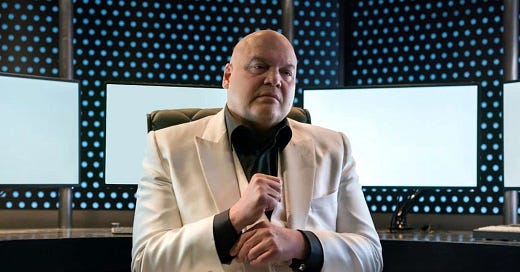Kingpin’s Humanity: What Makes Wilson Fisk Marvel’s Most Compelling Villain?
Vincent D’Onofrio’s Kingpin isn’t just a crime boss–he’s a man torn between love, power, and rage.
Marvel’s Daredevil is back in a new Disney+ series after its move from Netflix, and with it, Vincent D’Onofrio’s Wilson “Kingpin” Fisk returns as Daredevil’s archenemy. There’s a lot to say about Daredevil, but Fisk is a particularly compelling character worth exploring.
Fisk is a dominant presence wherever he appears, whether in Daredevil or his other Marvel appearances in Hawkeye and Echo. What makes him so compelling? For one thing, he’s larger than life, both literally and figuratively. When Fisk is on screen, he commands attention with his quiet rumble, his simmering explosiveness just beneath the surface, his physical menace, and his reasonable-sounding orders laced with the unspoken threat of violence.
But Fisk is more than his potential for violence or his brilliant, always-one-step-ahead scheming. Unlike Batman’s Joker, he isn’t a psychotic madman. He’s a criminal mastermind, unquestionably evil, but not insane.
Fisk also has surprising emotional depth. He’s a man who loves–most notably, his wife Vanessa. It feels real. He is genuinely vulnerable to her. Fisk expresses a depth of emotion rare among comic book villains. While the Joker is a manic sociopath, Fisk openly emotes–about art and food–and is even socially awkward. He is well-rounded, grounded, and believable.
His love for Vanessa isn’t just a subplot or a manipulative tool in his criminal empire–it’s fundamental to who he is. Their relationship humanizes him in a way most supervillains never experience. While many villains are solitary, inhuman embodiments of evil, Fisk’s love for Vanessa makes him feel almost tragically normal.
We also see this vulnerability in Fisk’s relationship with Maya Lopez in Hawkeye and Echo. After ordering her father’s death, Fisk adopted and raised Maya as a weapon in his arsenal. His love for her is twisted–rooted in deceit and betrayal–but it is still love. Even when she turns against him, he doesn’t stop caring. He wants a daughter, but he has no healthy concept of fatherhood or family.
Fisk’s flaws reveal that while he can love, his need for control warps his relationships.
Fisk is ultimately shaped by tragedy. His childhood, culminating in patricide against his abusive father, defines his struggles with loneliness, power, and rage. Like Batman, he endured trauma–but where Batman channeled his pain into heroism, Fisk used his to justify violence and intimidation, believing he was “cleaning up” the city rather than simply controlling crime. The logical flaws in this rationale matter less than the fact that Fisk believes it.
By exploring Fisk’s humanity and complexity, we see his internal war: his capacity for love and order constantly clashes with the rage and trauma that threaten to consume him.
And when that rage erupts, it’s terrifying. Fisk’s fights are visceral, like a bullied child finally snapping. They are shocking, emotionally charged, and memorable. Ironically, these moments strip away his crime-boss persona–revealing a force of nature, a man losing control. Beneath his terrifying violence is a scared, angry child. Fisk doesn’t want to be the monster. He doesn’t revel in destruction. He wants to be seen as strategic, intelligent, and urbane–a man doing the right thing for the people he loves.
This is the tragedy of Wilson Fisk: In different circumstances, could he have been a hero instead of a villain? Fisk is a different breed of comic book supervillain–one with a soul. His emotional depth makes him relatable, even sympathetic, as he struggles with love and family. And yet, he remains a menacing figure who wields evil to achieve his ends.
All credit to Vincent D’Onofrio, who has crafted a complex, human antagonist in an MCU often filled with CGI aliens and megalomaniacs. Fisk isn’t just a villain–he’s a man fighting his own demons even as he fights the hero.




